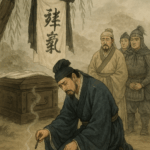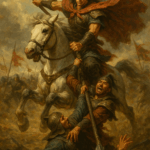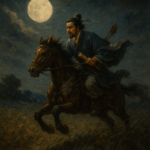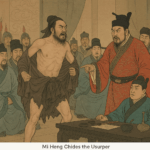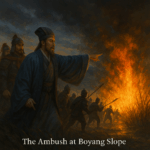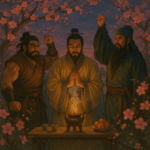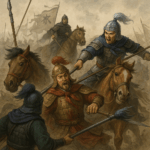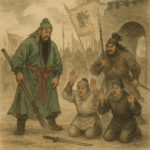Cao Cao was in full flight when reinforcements arrived from the south—Xiahou Dun led a detachment that intercepted Lü Bu’s vanguard. The two armies clashed fiercely until dusk, when a torrential downpour scattered both forces. Cao Cao returned to his camp, where he lavishly rewarded Dian Wei and promoted him to Commander of the Vanguard.
At Lü Bu’s camp, he and his strategist Chen Gong plotted a stratagem. Chen Gong said, “Within Puyang stands the wealthy Tian family, their household hundreds strong—a local power unto itself. We should secretly dispatch a letter via their servants to Cao Cao’s camp, claiming: ‘Lord Lü is cruel and heartless; the people hate him. He has marched on Liyang, leaving only Gao Shun inside. If you storm the gates tonight, I will open them from within.’ When Cao arrives, we set the four gates ablaze and spring our ambush. Even Cao Cao’s genius cannot save him.” Lü Bu agreed and sent the clandestine missive through the Tian household.
Cao Cao, still unsettled by his recent setback, hesitated—until the Tian envoy arrived with a sealed letter: “Lü Bu has moved on to Liyang; the city is undefended. Come swiftly—you will see a white banner marked ‘義’ on the wall as your signal.” Overjoyed, Cao Cao rewarded the messenger richly and began preparations. General Liu Ye cautioned, “Lü Bu may lack strategy, yet Chen Gong is cunning. Better to divide our army into three columns—two hidden outside as support, one to enter through the gate.” Cao Cao concurred and marched on Puyang at dawn.
Upon arrival, he surveyed the walls festooned with banners and spotted the single white “義” flag at the western gate. At noon, as the city gate opened, two commanders—Hou Cheng in front and Gao Shun behind—marched forth. Cao Cao sent Dian Wei charging straight at Hou Cheng; unprepared, he fell back through the gate, with Gao Shun likewise unable to hold the drawbridge. In the ensuing confusion, several armed men slipped past the defenders, claiming to be Tian retainers and produced the secret letter. It ordered: “At first watch tonight, a gong will sound from the gate—then advance. I will open the door.” Cao Cao deployed Xiahou Dun on the left, Cao Hong on the right, and personally led Xiahou Yuan, Li Dian, Le Jin, and Dian Wei as his inner column. When Li Dian urged, “My lord, remain outside—let us enter first,” Cao Cao thundered, “If I do not lead, who will?” and plunged straight in.
It was barely first watch under a dark sky when a bugle sounded from the western gate. Torches flared, the gate swung wide, and the drawbridge clattered down. Cao Cao spurred his horse inside—only to find the streets empty. Realizing the trap, he wheeled his steed and called, “Retreat!” From all sides, firepots lobbed incendiaries; drums thundered; battle cries rose like a storm. Zhang Liao emerged from the east alley, Zang Ba from the west—flanking the intruders. Cao Cao fled the northern exit, only to encounter Hao Meng and Cao Xing, who fell back after a fierce skirmish. Racing for the southern gate, he found Gao Shun and Hou Cheng blocking his path—until Dian Wei, teeth bared, carved a corridor through them. But Cao Cao had vanished. Dian Wei, realizing his lord was gone, plunged back into the flames in search of him, encountering Li Dian and then Le Jin, each unaware of Cao’s whereabouts. Undeterred, he fought through smoke and fire, scouring every alley.
Meanwhile, Cao Cao burst back into the camp under the cover of night. When the generals prostrated themselves in relief, he laughed, “I have fallen into a peasant’s trap—but I shall make them pay dearly!” His strategist Guo Jia urged immediate action. Cao Cao devised a bold counterplot: feign his own death from burns so Lü Bu would rashly pursue his “body” to Mount Maling, where concealed troops would spring an ambush. Mourning banners were hoisted, and word spread that Cao Cao lay fatally wounded.
Sure enough, Lü Bu led his army to Maling, only to be met by drummers sounding the attack and hidden spearmen swirling forth. Suffering heavy losses, Lü Bu retreated to Puyang and remained besieged thereafter.
That year, locusts swarmed across the Central Plains, devouring every grain. Famine drove men to desperation: a peck of rice cost fifty coins, and some turned to cannibalism. With supplies exhausted, Cao Cao withdrew his legions to Juancheng. Lü Bu likewise decamped to Shanyang in search of forage. For the winter, both sides held their ground.
Back in Xuzhou, Tao Qian, now sixty-three, fell gravely ill. Calling in Mi Zhu and Chen Deng, he lamented, “Cao’s armies have withdrawn only because Lü Bu seized Yanzhou. They will return come spring. Though I twice offered Xuzhou to Liu Bei, he refused while I was still well—but now, in my frailty, he cannot decline.” Delighted, Tao Qian summoned Liu Bei to Xiaopei under the pretense of discussing strategy. When Liu Bei arrived, Tao Qian confessed, “My end draws near. I beg you, for the sake of Han’s realm, accept the seal of Xuzhou. Only then will I die in peace.” Liu Bei pointed out Tao’s two sons—Shang and Ying—but the governor replied, “Neither is fit to rule. After my passing, I trust only you to guide this province.” Though Liu Bei demurred, Tao Qian clutched his heart and died. Mourned by the people and urged by Guan Yu and Zhang Fei, Liu Bei took up the governorship under flowers of white. He installed Sun Qian and Mi Zhu as his chief aides and Chen Deng as his secretary, bade the army and populace don mourning, and laid Tao Qian to rest on the riverplain, dispatching his memorials to the court.
News of Tao Qian’s death reached Cao Cao at Juancheng. Enraged, he vowed, “First I will slay Liu Bei, then exhumate Tao Qian’s corpse—only then will my debt be paid!” He mustered his forces to march on Xuzhou. Xun Yu counseled prudence: holding both Yanzhou and Xuzhou spread men too thin, and the people of Xuzhou, loyal to Liu Bei, would fight to the death. Better to “clear” the nearby revolts of He Yi and Huang Shao—bandits who had pillaged the provinces and amassed grain—to provision his army, pleasing both court and commoners. Cao Cao adopted this plan, left Xiahou Dun and Cao Ren to hold Juancheng, and first subdued the counties of Chen, Runan, and Yingchuan. He Yi and Huang Shao fell in turn—He Yi slain by Dian Wei, Huang Shao captured by Li Dian—and their riches seized to feed his legions.
With Yanzhou secure, Cheng Yu urged him to advance on Puyang. Cao Cao appointed Xu Chu and Dian Wei as vanguard, Xiahou Dun and Xiahou Yuan on the left, Li Dian and Le Jin on the right, himself commanding the center, with Yu Jin and Lü Qian covering the rear. They marched on Puyang, where Lü Bu prepared to sally forth. Chen Gong warned against meeting Cao’s forces outside—Lü Bu replied, “Who fears whom?” and rode out. Xu Chu engaged him fiercely for twenty exchanges until Cao Cao ordered the trap sprung: Dian Wei charged from the flank, and Xiahou Dun, Xiahou Yuan, Li Dian, and Le Jin poured in from all sides. Overwhelmed, Lü Bu retreated behind Puyang’s walls, crying out for the committed surrender of the Tian family—only to learn they had already pledged to Cao Cao. In fury, Lü Bu abandoned Puyang and fled to Dingtao, leaving Chen Gong to escort his family through the eastern gate.
Cao Cao entered Puyang unopposed and pardoned the Tian household. He garrisoned Zhang Liao and others to hold the city, then pursued Lü Bu to Dingtao. There, with no battle forthcoming and supplies low, Cao Cao withdrew forty li and made camp. When Lü Bu returned, Cao Cao feigned fear of an ambush among nearby groves—so he planted flags among the trees and concealed his troops along an embankment. Sure enough, Lü Bu’s army set fire to the woods, only to be struck by Cao’s hidden forces in a deadly crossfire. Suffering another crushing defeat, Lü Bu abandoned Dingtao and withdrew east.
Thus, Shandong fell entirely under Cao Cao’s control—his generals repairing walls and restoring order—while Lü Bu, ever restless, resolved to rally his strength anew.

